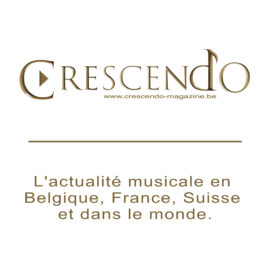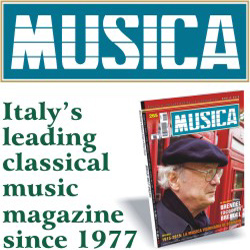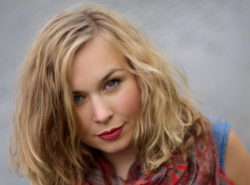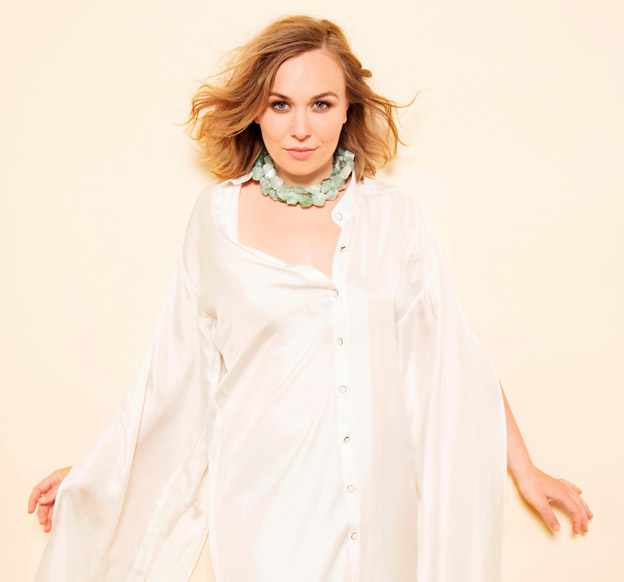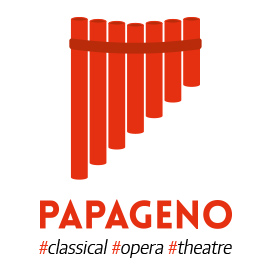The young French-Danish soprano Elsa Dreisig, now based in Berlin, will be honoured at the ICMA 2019 Award Ceremony in Lucerne for her fascinating CD Miroir(s), published by Erato: a well-deserved recognition for a real talent. ICMA Jury member Nicola Cattò from the Italian magazine Musica made the following interview with the singer.
The family name does not sound French at all: indeed, it is that of her mother Inge, a Danish soprano who has often sung at the Opéra royal de Wallonie. Very French, however, is her father, Gilles Ramade, a versatile artist, singer, pianist, director, composer, who has devoted many efforts to break the boundaries between musical genres, including rock, musical comedy and opera. An environment musically very fertile for Elsa Dreisig (born in 1991), who has recently released a debut album for Erato, entitled Miroir(s), which is among the truly unmissable ones of recent times for beauty of the vocal performance and interest of the artistic project. This CD was chosen by the jury of the International Classical Music Awards – which had already chosen the Franco-Danish soprano in 2017 as best young singer – as the best in the Vocal Recital category for the 2019 edition of the award (the awards gala will take place in Lucerne, at KKL, on 10 May). I spoke to her by telephone. She was in Berlin, where she is a permanent member of the Staatsoper and where she had just finished to sing the challenging role of Dircé (Glauce, in the Italian version) in Cherubini’s Medée, conducted by Barenboim.
Growing into a family of musicians meant that you were forced to follow your parents’ footsteps?
Not at all. Of course, my mother enrolled me in a children’s choir, but this was because she saw that, without anyone forcing me, I liked going to the opera, staying behind the scenes, accompanying her to the performances. And after starting with that choir, I always took all the important decisions alone, without my parents pushing me or, on the contrary, warning me about possible disappointments. I have never regretted this choice, because I am convinced that I could do no other job but singing. Of course, I love theatre, painting, and even the piano, which I also play: but in this case I feel a barrier that I cannot overcome.
Being a musician and a singer involves many joys, successes, but also sacrifices…
Certainly, it is necessary to know that the body is our work-tool and therefore we must treat it with care and respect: sometimes it is perhaps necessary to renounce to a party, to an evening with friends, avoid drinking and smoking. You cannot fall ill or feel too tired, so much that you have to cancel a concert or a performance. Apart from this, the life of the singer imposes some choices in your private live: for the moment, this is not a problem for me, because I also love being alone. But when the question of having children will be raised, I know that I will need a partner who guarantees the stability that I cannot offer, a men who is often at home: it is no longer a taboo to think of a couple in which the man is at home with children and the woman is away on business!
Are you always happy on stage?
When I sing, yes; when I play characters like Pamina, Eurydice, Violetta, I am always happy because they are perfectly suited to my voice. However, when I took excessive risks and faced awkward roles (for example too acute), I experienced the unpleasant feeling of a strong stress. On stage, you share an artistic experience with colleagues, and if you are blocked by some technical limits, you cannot give the best of yourself. An experience that, fortunately, I have very rarely experienced. In 90% of the cases, the hours on stage are the happiest of my whole life!
Speaking of suitable and less suitable roles, can we label your voice as typically French – by colour, line, sonority – or do you find that such a ‘frame’ does not make sense?
I must say that I have never thought thoroughly about this topic, but I think that, yes, my voice is, more than typically French, very suitable to the French repertoire: I feel it from the colour of the vowels, from the position of the consonants. Even when I sing in Italian and in German, I maintain a French emission, on which I work a lot, even listening to the great singers of the past: let’s think of Callas who, despite being Greek, knew how to use the Italian language better than many native speakers! Moreover, I try to be inspired by her, when I sing in Italian, while for German I am more facilitated, being half-Danish. Perhaps, to cut short, I can describe my voice as more northern than southern, in the way I pronounce the words and utter the vowels.
In fact, even listening to the CD, we notice an extreme care of the diction, which in French is perhaps more important than in Italian.
Yes, that’s right: and this gives my voice the French colour you have probably noticed.
You spoke about Maria Callas; do you have any other models that inspire you?
Several: in fact, I love very much listening to the great artists of the past and the present. I even like listening blind and in a few seconds, I can recognize who is singing! I love Fleming, Netrebko, Harteros: an interesting voice is a voice that can be quickly recognized, otherwise it is not worth going on, because you’ll always miss something. In addition to Callas, I love Rosa Ponselle very much (she was a model also for the Greek singer) and, coming to the present days, I admire Mariella Devia who, despite being a bit cold and distant on stage, is an absolute point of reference in terms of vocal technique. Callas burns, lays bare her soul, gives everything in a few moments, while Devia is a model of duration, of wise administration: it is all about preferring the one or the other approach. My character, I must say, pushes me more towards intensity than towards duration: and if this means that at fifty I will have to stop singing because I have given everything, well, so be it! There is no point in preserving oneself, being too careful to stay on stage until retirement!
In the CD booklet you write that « the impossibility of seeing my voice fascinated me »; is the mystery of vocal music described in this sentence?
Definitely, and — if you think about it — it is an apparently contradictory fact, that you can recognize a voice even without seeing it. This is what makes the voice the most miraculous instrument, which gives more emotion. The instrument is inside our body!
Let’s talk about the CD, which has a program, linked to the theme of the mirror, built with great intelligence, between famous pieces and rarities. Who had the idea?
Everything came out during a meeting in the Warner offices in Paris with Alain Lanceron, my agent and the Palazzetto Bru Zane people, who had a series of unpublished scores to propose: I too, of course, had clear ideas about what I wanted to sing. Warner, on the other hand, wanted a mix of known arias and rarities, to attract different types of audiences: and therefore, the idea of proposing the same character seen by two different composers was born, almost collectively. So you can find the Rosinas by Mozart and Rossini, the Juliettes by Gounod and Steibelt, the Salomés by Massenet and Strauss…
A ‘mirror’ of what you used to sing in the recent past, of what you are singing now and of what you will sing in the future?
Exactly so: my past is represented by Rosina in Barbiere, the role of my debut (I started as mezzo-soprano) while the present is Massenet’s Manon, which I am singing in Zurich. In the far future – let’s say in ten years – there is Salomé by Strauss, which I want to sing once I have the personal and vocal maturity: I chose, for this first tasting, the French version of the work, and I must say that it is even more complicated than the German one because, having a complete command of the language, there is the risk of lingering too much on the details, thus losing the general line. That is why I tried to focus more on the voice, on the phrasing, than on the words: without forgetting that every language has its particularities, and involves a certain type of esprit. I have lived in Germany for four years and only now begin to grasp the spirit of strictness, respect for the rules so typical of this country: a spirit that is reflected in music, where for example in the Italian Belcanto you must underline the freedom, find a more personal interpretation. In a way it’s a crazier spirit, which mirrors the character of the two countries: in the language you hear the past, the imprint of a nation. That’s why I want to learn Italian as soon as possible, since I have important debuts in the pipeline: Elvira in Puritani, Gilda and many Donizetti operas.
The mirror is linked to the idea of beauty: an increasingly important feature in the musical star system. How do you cope with beauty?
I cannot deny that the physical aspect is nowadays central to our work: and this worries me a lot. While the voice has always been something natural for me, I have struggled a lot more to accept myself physically: perhaps, the voice helped to sublimate this lack of confidence in myself, the difficulty to consider myself adequate to the high standards that our society imposes. This has probably helped me to improve as an artist: since I thought I could not compete physically, I focused everything on my voice, working hard. Today I can no longer separate the two aspects: my possible external beauty is inextricably linked to my voice.
And the directors are demanding more and more from the singers!
Here in Berlin I sang in three consecutive productions in which, from the beginning, I am in lingerie: not naked, but still physically very exposed. And a production by Falstaff [by Mario Martone] now on stage in Berlin shows Nannetta singing in bikini: honestly, I don’t know if I would accept. Fortunately, the role is too light for me, so the problem does not arise!
But in Salomé it could arise!
Yes, with the dance of the seven veils. I could be half-naked, or have to a double on stage; moreover, you need to know how to dance, be at ease with your body. We will see: they are no longer the times of Caballé!
Among the roles not perfectly suited to your voice, I would mention that of Dircé in Cherubini’s Medée: could you please describe your experience?
Exactly, it is one of those characters that caused me a lot of stress: I would call it a painful experience, because the tessitura is too high, unsuitable to my voice. Every time I went on stage, I didn’t feel completely at ease: but, on the other hand, it was great to work with Barenboim and with an artist I deeply admire, Sonya Yoncheva, who taught me a lot.
Mirella Freni has often said that career goes on only with many “no”: do you agree?
Completely: I am only 27 years old, but I realize I have already made some errors of youth!
Your curriculum also includes non-strictly classical experiences, such as the musical comedy Les parapluies de Cherbourg: why?
I really love the musical comedy that, with the opera, was part of our home-soundtrack, when I was a child. No jazz, no songs, no pop, nothing of what my schoolmates listened to: only Grease, The sound of music or Traviata and Bohème! And still today, when I play concerts, I try to insert some operetta or musical pieces: it helps a lot to preserve softness and flexibility, both vocal and interpretative.
After Miroir (s), which other recording in the pipeline?
A CD dedicated to Lied and mélodie, with piano: French, German and Russian music, a sort of journey through repertoires from all Europe.



